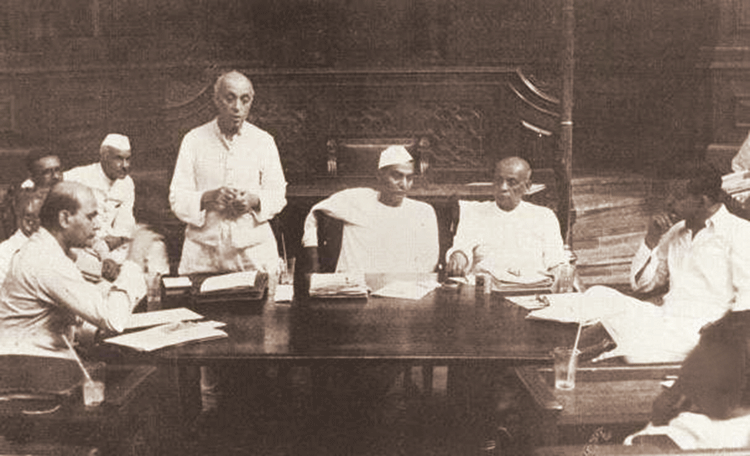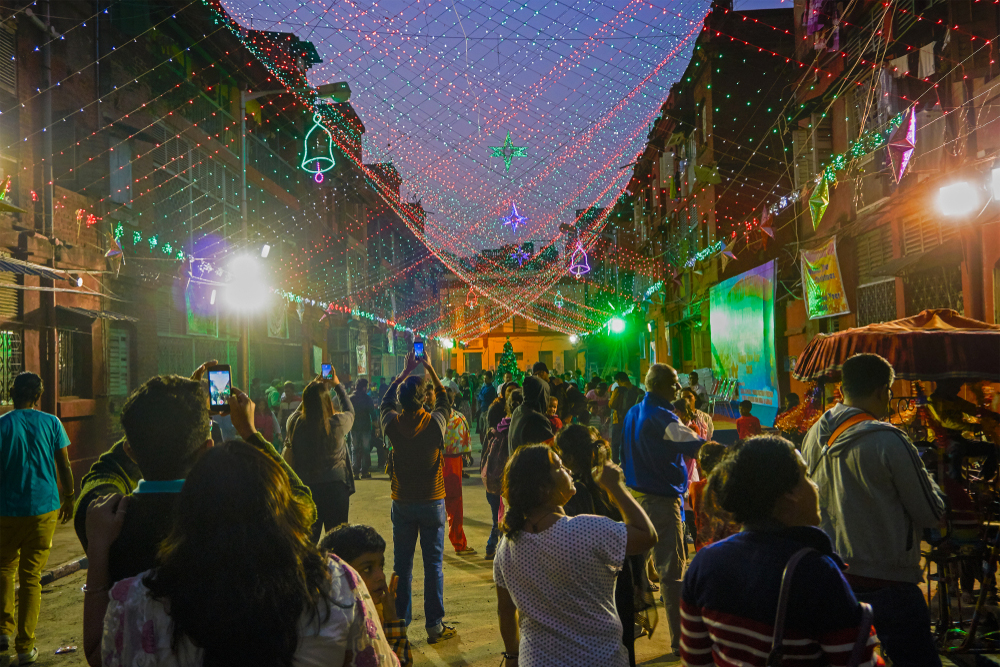Say ‘Anglo Indian’ and those who are not Anglo Indian themselves will conjure up a certain image — brown to blonde to golden hair, light to pale grey to true blue eyes, freckles and furrows that could be ‘ours’ yet different, ‘we’ yet in another way, ‘one’s own’ yet ‘not quite oneself’. Attires straight out of one’s boring wardrobe or bored trunk yet strangely smarter. Speaking an English difficult to describe but tempting and easy to copy (‘No, Men’, so much more tender than ‘No, Man’). A cuisine blending Indian substances with un-Indian devices of which Devil Chutney is King, Pepper Water (an alternative rasam), Queen, and Curried Trotters an all-weather Aunt. A lissome ease in cricket, a smooth swing in billiards, a flair for school teaching, magic with quizzes, a way with written words, panache on the stage, studio and screen, genius in music sung or played, a swirl in dance, an ornament in legislatures, a glory in national defence.
And above all, in a niche all its own, a collective romance. Is that possible? In India, yes. The Anglo Indians’ idyll with the Indian Railways is quite exactly that. And will last, even when not one Anglo Indian in shiny black jacket and brave tie serves on them, for as long as rolling stock shudders on Bharat’s iron tracks. John Masters’ Bhowani Junction (1954) is not the world’s greatest novel, nor the film (1956) of that novel with Ava Gardner playing Victoria Jones and Bill Travers, the hero, Patrick Taylor, an Oscar winner. But of truer intent a piece of fictionalized history has not been written, or filmed, reflecting the trials, torments of being part of a community, born of British (specifically, English) and Indian parents. This excerpt from the story captures it all:
Patrick Taylor: Where’s your hat?
Victoria Jones: I never wear it, unless I have to.
Patrick Taylor: But, the sun — it will get you all brown at this time of day.
Victoria Jones: It’s not the sun that makes us brown, now, is it.
Yet, the non-Anglo Indian visual of the Anglo Indian also holds behind that frame the dust of neglect and tangled cobwebs of prejudice. These are the products, first, of partial awareness, incomplete knowledge, ‘set’ attitudes, haste and, at the end of it all, an impatient, blind predisposition towards an ‘us’ and ‘they’ typification of people. And buttressing them is the vein of power in the global ‘major’ that desires to dominate the ‘minor’, whoever she or he is.
A democracy is about majority rule. Good democracies ensure that this does not hurt minorities. Bad democracies could not care less. A republic is about sheltering all — majority and minorities, equally. Good republics ensure that the smallest has the same status as the biggest. Bad republics are not bothered.
Wanting the Indian masses at long last to have a say in the governance of India, the architects of our Constitution opted to be a democracy. Wanting, simultaneously, India to be a just nation, fair and even-handed to all, they opted to be a republic as well. And sought to be good at both, not fake.
One of the earnests of this intent was the Constituent Assembly’s decision, enshrined in Article 331, to reserve two seats in the Lok Sabha for representatives of Anglo Indians and to provide for state assemblies to do the same. In the midst of all its preoccupations with rights and responsibilities, the jurisdictions of the executive, legislature, judiciary and balancing unitary and federal nostrums, why and how did this concern for Anglo Indians come into the Constituent Assembly’s calculations?
It came in because of the wisdom of that Assembly. Renaissance men and women comprising that body had what may be called a restless concern for India’s vulnerable, disempowered social groups. This led, most famously, in the reservation in the Lok Sabha of 84 elective seats for the scheduled castes and, likewise, 47 for the scheduled tribes, enshrined in Article 334.
In reserving the two seats for Anglo Indian members of parliament and for Anglo Indian members of legislative assemblies, the Constitution went beyond even what it had done for the SCs and STs. Not in terms of numbers, obviously, but in terms of the mode. The reserved Anglo Indian seats were to be filled by nomination, not election. This meant they would not have to contest elections, would not have to electioneer, ask for votes. This was affirmative action not by arithmetical justice but procedural facilitation. Why and what for? For, the architects of the Constitution knew that by virtue of who and what they were, Anglo Indians had not entered the currents of Indian politics, of the freedom struggle, had not formed themselves into a political force that could marshal or even catalyse electoral resources. And yet being India-born, being residents of India, were part of the tapestry of India, its mosaic, its life-blood. They could not be left voiceless in the many-tongued legislatures of the new nation.
To adapt a phrase of the former president, K.R. Narayanan, from another context, the path of nomination in an electoral democracy is a pedestrian crossing laid through a zooming highway to let the un-motorized, un-engined and un-wheeled to feel and be mobile. The nomination route of twelve such MPs to the Rajya Sabha and of similar MLAs to legislative councils where they exist is to enable those who have contributed to arts, literature, sciences and social services but who, in the cut and thrust of electoral contestations, would not stand a chance of getting elected, to participate in legislation. The nomination of Anglo Indian MPs and MLAs follows the same logic.
Did not the Parsis, it could be asked, by the same token, deserve the same consideration? And Indian Jews? Touche! one might respond, good point! But the ‘point’ overlooks a fundamental fact. The reservations for and nominations of the Anglo Indian legislators had nothing to do with religion and everything to do with representation. The provision was not to make of the Lok Sabha a Conclave of Religions. What was envisaged in giving Anglo Indians legislative space was giving a section of India representation not because it was Christian but because it was politically un-electable on its own.
The provision for nominating Anglo Indians was meant to lend a hand to a demographically weak, culturally isolated and politically unorganized but distinctive and proud community whose voice needed recording, whose presence needed space, not for the gratification of that community but for the completeness of our democracy, of our republic. Article 331 did not do Anglo India a favour, it did India’s political self-image a service.
While extending, rightly, the reservation of seats for SC and ST legislators, Parliament has extinguished the reservation for Anglo Indians. True, the provision was subject to the president’s (read government’s) sense of the need for that reservation. The ‘small’ number of Anglo Indians, we are told, was one of the reasons given for ending the provision. A figure was cited, with little basis. But smallness of size, in fact, would have made an extension even more logical.
So, the question is, ‘Why?’ A restless concern for domination activates India’s dominant classes now.
In a home, well-off or poor, that which is precarious, precious, rare, is specially nurtured. It is held in both hands, swaddled in caring fabric. Our Constituent Assembly knew that. It cradled the shards of history, the fringes of human sensibility, even as it created the loams of posterity.
When Frank Anthony suggested the reservation of seats by nomination for Anglo Indians, his point was appreciated at once. But then that was the age of Gandhi, Nehru, Ambedkar. Variation was prized then, not...
I leave it to the reader to complete that line.












